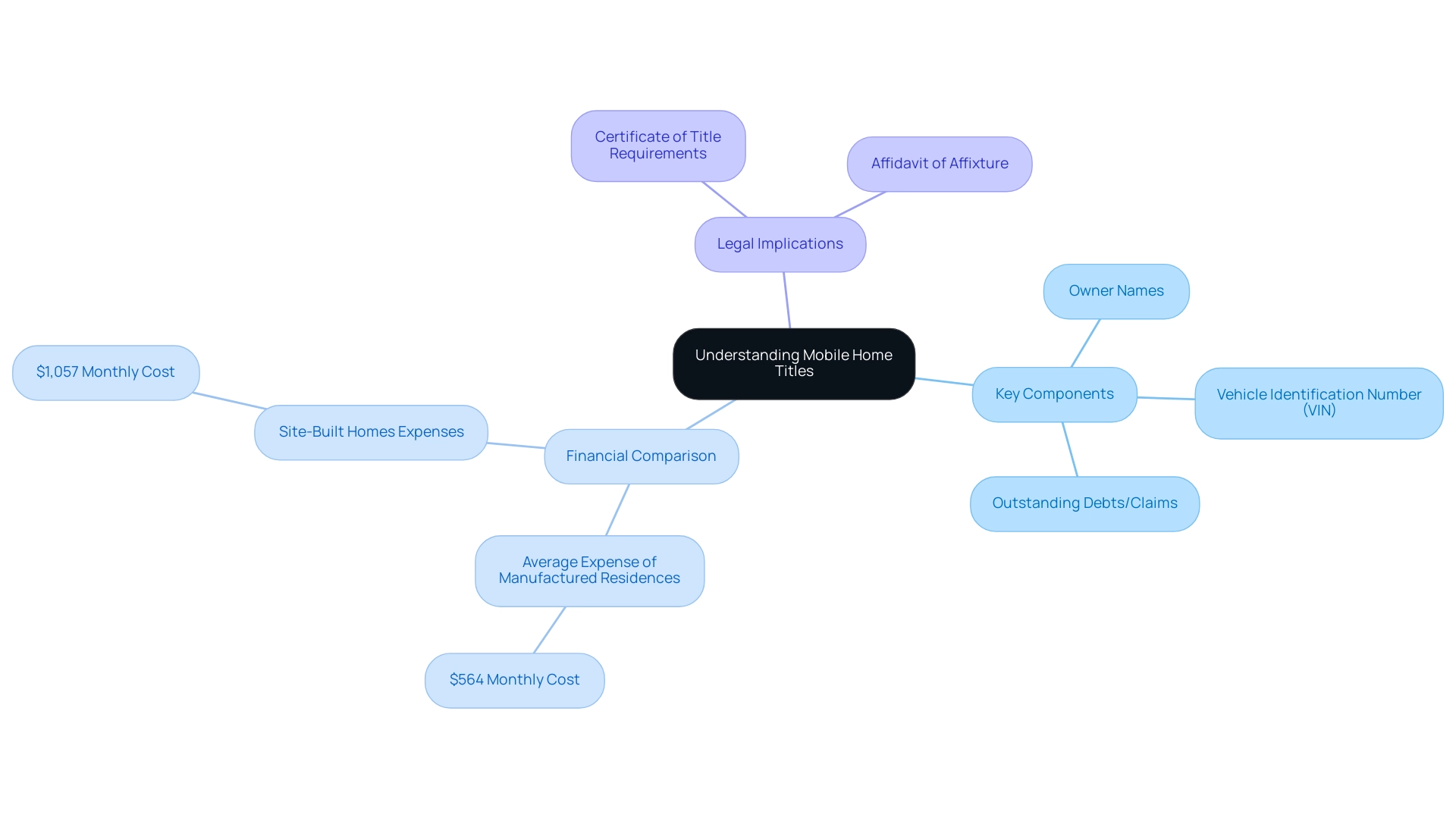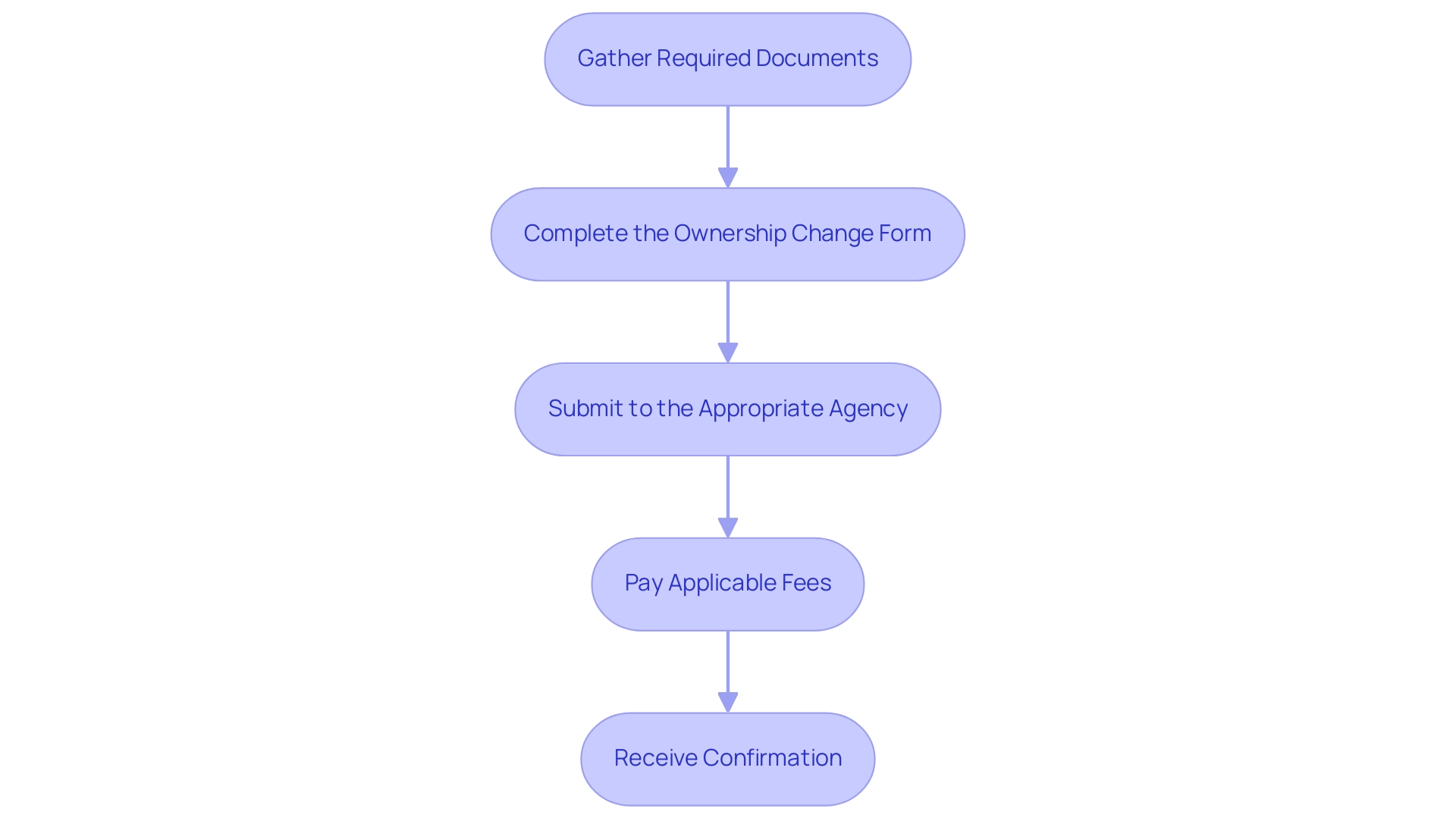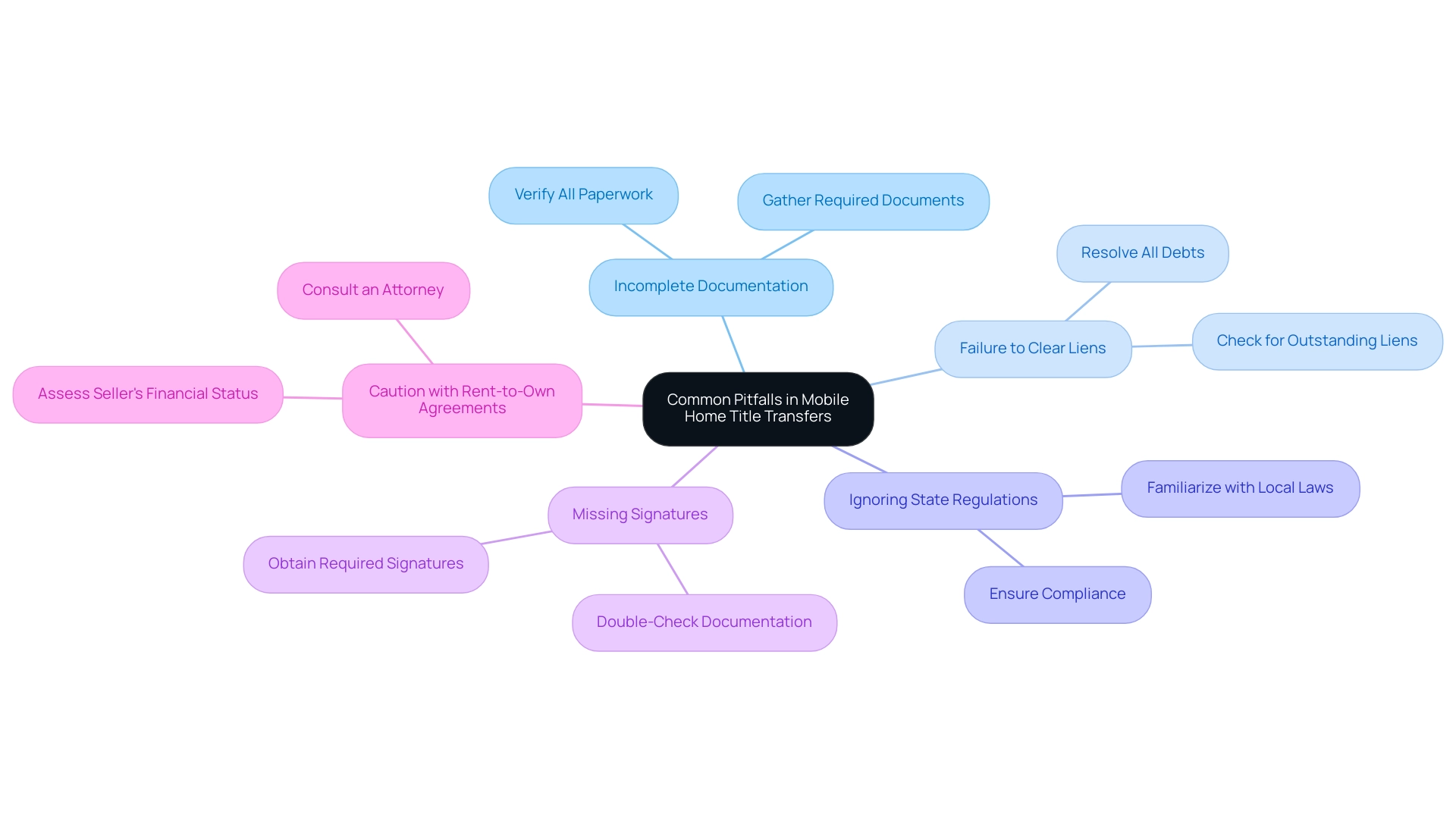Overview
Mobile home title services are essential for ensuring successful ownership transfers, requiring meticulous attention to documentation and compliance with state regulations. The article outlines best practices, including gathering necessary documents, understanding local laws, and avoiding common pitfalls, to facilitate a smooth transaction process and mitigate legal risks associated with mobile home ownership.
Introduction
Understanding mobile home titles is essential for anyone involved in real estate transactions, as these documents are the backbone of ownership claims and legal rights. Mobile home titles not only signify ownership but also encapsulate vital details such as liens and encumbrances that could impact the property’s value and usability.
In a market where mobile homes are increasingly recognized as a viable and affordable housing option, comprehending the nuances of these titles becomes imperative.
This article delves into the intricacies of mobile home titles, offering crucial insights into their importance, the step-by-step process for transferring ownership, common pitfalls to avoid, and the pivotal role of title companies in ensuring smooth transactions.
By equipping professionals with this knowledge, it paves the way for informed decision-making and successful dealings in the mobile home market.
Understanding Mobile Home Titles: Importance and Key Information
Manufactured dwelling documents act as crucial legal papers that not only confirm possession of a manufactured structure but also outline any liens or claims linked to the property. For real estate professionals, understanding the importance of these designations is paramount, as they provide insight into the current legal status of the property. Essential components found within include:
- The names of the owners
- The vehicle identification number (VIN)
- Any outstanding debts or claims against the property
Understanding this information is crucial in preventing potential disputes and ensuring adherence to local regulations. In a housing landscape where affordability is increasingly vital, it’s noteworthy that manufactured residences can appreciate in value comparably to site-built structures, making them an attractive housing option. As HUD noted, "In the historically tight United States housing market of the 1990s and early 2000s, housing advocates acknowledged the manufactured dwelling as an increasingly important element of the unsubsidized affordable housing sector," emphasizing the need for diligent management of title issues.
Furthermore, the average monthly expense of a manufactured residence is $564, compared to $1,057 for site-built houses or apartments, illustrating significant savings on housing expenses. Recent updates indicate that in certain states, a Certificate of Title may not be required for new transportable structures permanently affixed to land; instead, an affidavit of affixture must be filed. This alteration highlights the significance of remaining knowledgeable about mobile home title services and the legal consequences associated with manufactured dwelling certificates.

Step-by-Step Guide to Transferring Mobile Home Titles
The process of transferring a manufactured dwelling's ownership involves , which is an essential procedure that demands careful attention to detail. Here are the essential steps to ensure a smooth process:
-
Gather Required Documents:
Begin by collecting the original mobile home certificate, a bill of sale, and any lien release forms that may be necessary for mobile home title services. This documentation is foundational to establishing ownership.
-
Complete the Ownership Change Form:
Fill out the ownership change form meticulously, ensuring that all required signatures are obtained. Accurate completion is vital to prevent delays in processing.
-
Submit to the Appropriate Agency:
Depending on state regulations, submit the completed forms to either the Department of Motor Vehicles (DMV), a designated title office, or mobile home title services. Understanding local requirements is crucial, as processes can vary.
-
Pay Applicable Fees:
Be prepared to pay transaction fees, which differ by state. For instance, some states may impose a 6% use tax based on the mobile home’s value, which must be factored into your financial planning. This tax can significantly affect the overall expense of the transaction, making it essential to budget accordingly.
-
Receive Confirmation:
After submission, you will receive confirmation once the processing is complete, resulting in a new designation that accurately reflects the change in ownership. As John Fedro, a seasoned mobile home investor, points out, 'Grasping the ownership change procedure is essential for both purchasers and vendors to guarantee a seamless transaction.'
Additionally, consider the typical situation where a seller holds the original document but is not the true owner. In such situations, if the rightful owner has signed the document, the seller can convey it to themselves and then to the buyer. However, if the seller's ownership documentation is incomplete, the legal owner must be located to sign the document before any change can occur, as bypassing the chain of ownership is illegal.
Following these steps diligently not only ensures compliance with legal standards but also facilitates a smooth transition of ownership using mobile home title services.

Common Pitfalls in Mobile Home Title Transfers and How to Avoid Them
Navigating the complexities of manufactured dwelling title changes requires vigilance and the assistance of mobile home title services to avoid common pitfalls that can jeopardize transactions. With a total value of $57,550 associated with , understanding the risks of mobile home title services is crucial. Key issues include:
-
Incomplete Documentation: Neglecting to gather all required documents can significantly delay the process of moving.
It's essential to meticulously verify all paperwork to ensure completeness.
-
Failure to Clear Liens: Outstanding liens pose a serious risk; if not addressed prior to the change of ownership, they can lead to complications that may jeopardize ownership.
Resolving all debts before proceeding is crucial.
-
Ignoring State Regulations: Each state enforces specific requirements for document changes, and non-compliance can result in legal repercussions.
Therefore, it's imperative to familiarize oneself with local laws governing mobile home title services transactions.
-
Missing Signatures: A frequent error is neglecting to obtain the required signatures on the ownership change document.
Incomplete signatures can invalidate the transaction, rendering the process ineffective.
-
Caution with Rent-to-Own Agreements: Exercise caution with rent-to-own agreements, as issues can arise if the seller has used the property as collateral for other loans, potentially leading to loss of the property.
A cautionary tale underscores this risk, where a buyer believed they had obtained a legitimate ownership document but later encountered eviction due to the seller's financial mismanagement.
By identifying these challenges and applying proactive strategies, experts can guarantee a more smooth and effective relocation experience. As Jack Butala aptly cautions, Skipping land due diligence can cost you—big time.

The Role of Title Companies and Legal Considerations in Title Services
Mobile home title services are integral to , ensuring a seamless transition through comprehensive title searches and the provision of title insurance to safeguard against unforeseen claims. Approximately 73 percent of new manufactured homes are categorized as personal property, referred to as 'chattel', which presents unique challenges for companies as they navigate the complexities of this specific market. They meticulously verify that all legal requirements are fulfilled and that the ownership is devoid of defects prior to the transfer.
Furthermore, with the integration of Parse Ai's advanced machine learning tools, companies can leverage automated document processing capabilities, enhancing the precision and efficiency of research. Parse Ai's comprehensive research automation includes methodologies that streamline the extraction and analysis of data from documentation, allowing for faster and more precise research outcomes. This technology empowers landmen by utilizing features such as OCR technology and interactive labeling to streamline their workflows.
Title companies are adept at navigating the intricacies of local regulations, offering legal counsel when necessary. This expertise not only streamlines the transaction process but also mitigates potential legal challenges that may arise, such as disputes over ownership or liens. Engaging a reputable firm can significantly save time and reduce legal complications, thereby positioning them as an invaluable asset for real estate professionals.
As highlighted by a representative from Sunshine Signing, 'Over the past few years, we have come to view Sunshine Signing as a part of our company. They are our virtual scheduling department. The interaction is seamless and reliable.'
This highlights the significance of dependable partnerships in the documentation process, which enhance the efficiency of mobile home title services. Additionally, tracking data from MH Communities of Texas from 2012 to 2024 YTD reveals trends that further emphasize the evolving role of real estate firms in this market. It is also crucial to consider the significance of having both lender's and owner's insurance policies, as this ensures comprehensive protection for all parties involved in , safeguarding against potential claims.
Navigating State-Specific Regulations for Mobile Home Title Transfers
Navigating the intricacies of manufactured dwelling ownership transfers necessitates a thorough comprehension of mobile home title services and the distinct regulations that differ by state. For instance, certain states necessitate notarization of ownership documents, while others impose specific requirements regarding forms or fees. It is critical for professionals in this field to thoroughly research their state's regulations on mobile home title services, as compliance is paramount.
A timely response is essential; for example, a notice to remove must be issued within 10 days of notifying the homeowner of nonpayment. Furthermore, when the NADA value is lower than the purchase price, utilizing the Certification of Retail Value and Purchase Price form is essential for precise ownership change. To enhance your understanding and ensure smooth transactions, consider consulting with local property companies or legal experts.
As John Fedro aptly puts it, 'I hope this helps and points you in the right direction.' Staying current with state-specific laws not only aids in compliance but also streamlines the process for your clients in mobile home title services, ultimately fostering trust and efficiency in your practice. Additionally, consider the case of solar energy system installation, where regulations prohibit management from restricting homeowners from installing renewable energy systems.
This example underscores the importance of understanding compliance issues that can affect title transfers.
Conclusion
Mobile home titles are vital legal documents that confirm ownership and outline any liens or encumbrances associated with the property. For real estate professionals, understanding these titles is essential to avoid disputes and adhere to local regulations, especially as mobile homes become increasingly recognized as affordable housing options.
Transferring mobile home titles involves critical steps, including:
- Gathering necessary documents
- Completing transfer forms accurately
- Submitting them to the appropriate agency
Attention to detail is paramount, as pitfalls like incomplete paperwork and unresolved liens can complicate transactions.
Title companies are integral to this process, conducting thorough title searches and providing title insurance to safeguard against unexpected claims. Their use of advanced technology enhances the efficiency and accuracy of title research, streamlining the transaction process.
In conclusion, a thorough understanding of mobile home titles, the transfer process, and the role of title companies is crucial for real estate professionals. By staying informed and diligent, they can navigate the complexities of the mobile home market effectively, ensuring successful and compliant transactions. As the demand for affordable housing grows, managing mobile home titles remains a critical aspect of maintaining the integrity of real estate dealings.
Frequently Asked Questions
What is the purpose of manufactured dwelling documents?
Manufactured dwelling documents serve as crucial legal papers that confirm possession of a manufactured structure and outline any liens or claims linked to the property.
What essential components are included in a manufactured dwelling certificate?
A manufactured dwelling certificate includes the names of the owners, the vehicle identification number (VIN), and any outstanding debts or claims against the property.
Why is understanding manufactured dwelling documents important for real estate professionals?
Understanding these documents is important as they provide insight into the current legal status of the property, helping to prevent potential disputes and ensuring compliance with local regulations.
How do manufactured residences compare in value appreciation to site-built structures?
Manufactured residences can appreciate in value comparably to site-built structures, making them an attractive housing option in an increasingly vital affordable housing landscape.
What are the average monthly expenses for manufactured residences compared to site-built houses?
The average monthly expense of a manufactured residence is $564, while it is $1,057 for site-built houses or apartments, illustrating significant savings on housing expenses.
What recent changes have been made regarding the title requirements for transportable structures?
In certain states, a Certificate of Title may not be required for new transportable structures permanently affixed to land; instead, an affidavit of affixture must be filed.
What are the essential steps in the process of transferring ownership of a manufactured dwelling?
The essential steps include gathering required documents, completing the ownership change form, submitting to the appropriate agency, paying applicable fees, and receiving confirmation of the ownership change.
What documents are needed to begin the ownership transfer process?
Required documents include the original mobile home certificate, a bill of sale, and any necessary lien release forms.
Where should the completed ownership change form be submitted?
The completed form should be submitted to either the Department of Motor Vehicles (DMV), a designated title office, or mobile home title services, depending on state regulations.
What should one be aware of regarding fees during the ownership transfer process?
Transaction fees vary by state and may include a use tax based on the mobile home’s value, which should be factored into financial planning.
What happens after the ownership change forms are submitted?
After submission, you will receive confirmation once the processing is complete, resulting in a new designation that accurately reflects the change in ownership.
What should be done if the seller holds the original document but is not the true owner?
If the rightful owner has signed the document, the seller can convey it to themselves and then to the buyer. However, if the seller's documentation is incomplete, the legal owner must be located to sign the document before any change can occur.




